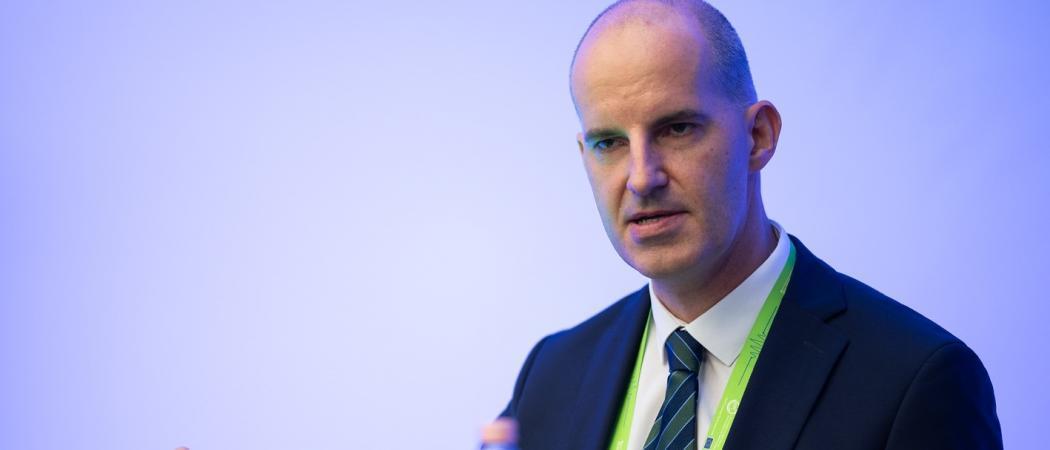First year will be dedicated to setting up the network, but the Fraunhofer-led consortium has plans to train thousands of entrepreneurs and support businesses in their green transition

EIT Director Martin Kern. Photo: EIT.
The European Institute of Innovation and Technology’s (EIT) newest innovation community dedicated to the creative and cultural sectors is just a few steps away from getting off the ground.
Last month, the EIT selected a 50 organisation group led by Fraunhofer-Gesellschaft Haus to set up its newest innovation community, which will initially run hubs in six countries.
The Knowledge and Innovation Community (KIC) on Culture and Creativity will be EIT’s ninth sector-specific innovation network, training and supporting entrepreneurs around Europe to help them turn research and ideas into products.
The new KIC aim to boost the innovation potential of the cultural and creative sectors and industries by creating stronger links between entrepreneurs, investors and other stakeholders in the many different industries that make up the creative sector. As part of the effort, the KIC hopes to provide training to 25% of the sector’s workforce and support 500 companies in their green transformation.
Martin Kern, director of the EIT, has high hopes for the consortium selected to deliver on the promises. The plan, he says, includes setting up of new incubation schemes, linking networks of creative hubs, culture institutions and entrepreneurs across Europe and providing an experimental space to enable innovation. “What they hope to achieve is break down boundaries within the sector. This is something that was not there within the creative sectors and industries,” says Kern.
Creative industries
The work will be coordinated by Bernd Fesel, director of the European Creative Business network. Fesel started out in the creative industries running his own art gallery promoting up and coming artists. From there, he moved on to be the head of the European Gallery Association. In 2010, he was vice director of the campaign that earned Germany's Ruhr region the title of the European Capital of Culture.
Fesel says the new KIC is a chance to raise awareness about the importance of the creative industries. In 2019, 7.6 million people were employed in the sector, mostly in small and medium-sized companies. They are designers, architects, media producers, musicians - the workforce behind many products people could not imagine their day without. But the economic significance of these industries is rarely acknowledged.
“You can go to work without a car, but never without creative industries,” says Fesel. “Because of this daily use, even if it’s unconscious, it’s one of the biggest economic drivers we have and also a big innovation driver.”
In recent years, support for the creative industries has been picking up. The EU is providing financial support and big companies in the field are investing more and more in innovation. But Fesel says the different industries that fall under the cultural and creative umbrella rarely work together and learn from each other. The KIC hopes to change that. “Our sectors are diverse, but diversity also leads to silos. This is the big chance to overcome these silos,” he told Science|Business.
The new KIC arrives on the scene at a time of flux. As Europe goes through a multiplicity of crises, the COVID-19 pandemic, inflation, rising cost of energy, climate change, the industries are hit by one external shock after another. This keeps shifting priorities. The climate crisis calls for new types of architecture, the video streaming business experienced a boom as people sat out the pandemic bored at home, while live events came to a screeching halt back in 2020 when COVID-19 first broke out and the sector only recently started recovering.
In these uncertain times, crisis support will be one of the KIC’s focus points. “One really has to look into those external shocks and find specific tools to overcome them, to launch investments again,” said Fesel.
Starting up
To get the new KIC off the ground, the consortium will get a grant of up to €6 million for 2023. This will help set up the infrastructure, create service centres in six regions, bring stakeholders on board and create legal entities. “It’s a start-up year,” says Fesel.
Kern expects the consortia to start work immediately. Over the summer, the partners will draw up a plan for the set-up and in the course of next year the EIT will officially sign the partnership agreement. “We move very fast because we don’t want a gap between the designation and when things get started,” said Kern.
He noted the process of launching a new innovation community is a well-oiled machine. “This is our fifth wave of KICs. We have the experience,” said Kern.
But the start up phase won’t all be dry administrative work. The consortium plans to run engagement forums to reach out to stakeholders to learn about their needs and present the new KIC. “That’s one of the first things for 2023, listening,” says Fesel.
Setting up synergies with other EU policies and programmes is also part of the initial set up phase. The partners are eyeing up cooperation on the EU Pact for Skills and the Commission’s culture and innovation project, the New European Bauhaus.
After 2023, the KIC’s budget will grow to around €70 million per year and the community will offer educational, support and business creation and acceleration programmes across Europe. The KIC is also expected to raise additional funding from the public and private sectors.
Bernt says the biggest challenge will be ensuring the take up of the services in the sector, especially among the small companies that dominate in the sector. This is why he wants to start the engagement activities early. “But we have networks to tackle this,” Fesel adds.





 A unique international forum for public research organisations and companies to connect their external engagement with strategic interests around their R&D system.
A unique international forum for public research organisations and companies to connect their external engagement with strategic interests around their R&D system.